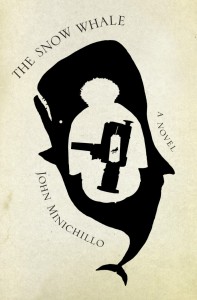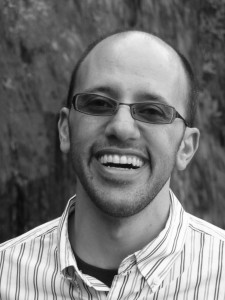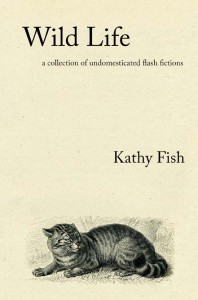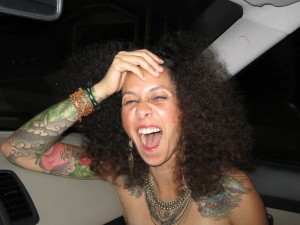 Q (Katrina Gray): Hello, Thomas Pluck and Fiona Johnson. You’ve started a group with some guts: The Lost Children Challenge. How did the idea come about?
Q (Katrina Gray): Hello, Thomas Pluck and Fiona Johnson. You’ve started a group with some guts: The Lost Children Challenge. How did the idea come about?
Thomas: The idea was all Fiona’s. I’m a moderator for Flash Fiction Friday, and we have a rotating guest spot. I chose Fiona because she writes dark tales that have a strong emotional foundation and a moral core. She did not disappoint. In the interest of full disclosure, she’s also a friend who encouraged me to submit my work for publication, and I still owe her for that one.
Fiona: Tommy invited me to be the guest writer on Flash Fiction Friday where I am a fairly regular contributor. My challenge was to come up with a story prompt that would inspire and get a range of people to take up the challenge. I spent a lot of time thinking about the sort of prompt that I would cause a response in me. As I am a visual person, I suddenly thought of Danielle Tunstall and the amazing images she creates. I clicked through her albums on Facebook until this picture of a child with a man’s hand covering her mouth appeared. The child’s eyes are full of stories and I knew that this was my prompt. The words came quickly after that. I’m a teacher and over the years I’ve looked into too many damaged children’s eyes so I’m well aware of the harm that sadly is still being done to our children.
There are so many children’s charities around the world, which indicates how many problems need to be solved, and how many children need help. How did you choose the charities that will benefit from the project?
Thomas: I chose PROTECT.org because my major writing influence is Andrew Vachss, who helped found the organization. For a long time he’d been saying that children’s advocates needed a PAC like the NRA. The NRA only cares about the 2nd Amendment; most organizations that fought for stronger children’s protections and funding for existing programs also had a host of other causes they supported, so they would have to decide which was more important at times. PROTECT has no such difficult decision to make. In 2008 they got the PROTECT act passed and the continuing onslaught of child pornography convictions is due to their hard work.
Fiona: I’ve been thinking for a while that I want to do something special to mark my 50th birthday. I don’t need anymore presents so instead I decided that I’d have a 50th birthday give-away where if people would write me stories, I’d donate cash to Children 1st, the Scottish society for the prevention of cruelty to children. The charity just matched the prompt exactly and as I’ve spent most of my life giving children the best opportunity I can with their education, it just made sense.
You two are ponying up some big bucks for this. Were you concerned about getting, say, 10,000 stories, and having to refinance your mortgages? The Fictionaut community is pretty big and prolific, you know. We do powerful things.
Thomas: I’m not a rich man. However I do spend too much on books, burgers and beer. If 10,000 joined in, I’d pay it off month by month without telling my wife. And I write crime stories, so I’d rob a banker or a hedge fund manager with all the criminal knowledge I’ve absorbed. I’d have a hard time putting all the entries in a blog post on www.flashfictionfriday.com though!
Fiona: If there are more stories than I can afford to pay for just now, I’ll just pay them off one week at a time until I’ve cleared my debt! The challenge does have a time limit, so that should help too!
So many writers have had way-less-than-ideal childhoods. I’m thinking James Joyce, Frank McCourt, Tobias Wolff, Stephen Elliott. Lots of others. Writing can be therapeutic, sure, but I think there’s more going on with the connection. Do you have your own ideas about early hardship shaping an artist in a way that nothing else can?
Thomas: I think most artists have a desire to be heard that stems from an early need. I was the firstborn and had a wild imagination that’s never left me. I won’t say I had a hard childhood because I know many who’ve had so much worse. There was hardship, and there were heroes. Heroines, to be precise, who pulled my sister and I through. I won’t presume that all writers have had similar experiences, but it certainly helps to know pain if you plan on depicting it or dissecting it.
Fiona: I don’t know if you must have experienced hardship to be a writer but I think you have to have had life experiences, good or bad. I think there comes a greater understanding of the human condition with age, this won’t be true for all writers, but to sing a love song you have to have had your heart broken and to write, you have to have experienced the full range of emotions that people experience over a lifetime.
I’m about to get personal here. Can you pinpoint how something in your own childhood that influences your own writing today? Does it work that way for you?
Thomas: My parents divorced when I was six, and it was a messy one. It taught me a lot about revenge, love and how it can bitter into hate. The feelings from that time are the live wire that powers my still-crazy imagination. I had a lot of fear at the time and fear is the root of all anger. If I were to pinpoint one moment, it would be when I was eleven, and I was hanging out with a kid named Travis, whose mother left him alone all day- he’d eat from people’s gardens- and a kid named Joey, who wore a white shirt and chinos, visiting his old Italian grandparents. Not a snobby kid but his family had money. We were in an old park and for no good reason, Travis threw a cinder block at Joey’s head. Blood sprayed. Joey cried and ran. He was okay, I heard, but I never saw him again. Travis said I snitched on him. He didn’t seem to get in much trouble over it. I still think of the mindless, fatherless rage Travis had to feel to do that, to a stranger, out of pure hatred and envy. It still terrifies me, and the Lost Children challenge is partly about the fact that we make our own monsters, by tolerating their physical and emotional abuse, and their suffering through neglect and need.
Fiona: Childhood has a strong influence on my writing. I can now stand back and consider things that happened and try to get under the skin of what was really going on that I wasn’t aware of as a child. A lot of understanding comes through being a mother, a wife, a wage earner myself.
If another writer wanted to start a challenge like this one, what are the steps to get it going?
Thomas: Choose something you’re passionate about. You can’t fake that kind of emotion, and it becomes infectious. Being part of an active and friendly community like Fictionaut certainly helps, and I’d like to thank everyone who participated or made suggestions. You need to set some sort of ground rules, like length, deadline, perhaps genre if that matters to you. A little structure for the ivy to climb.
Fiona: I would say don’t do it yourself. I’ve had a great time working with Tommy and Danielle on this challenge. We’ve worked as a team and that’s been very satisfying. Use all the social media sites to publicize and don’t be shy, just go out there and directly ask people for their support and you’ll be surprised at how generous others are with their time and talent.
You guys are awesome.
Thomas: Thank you for this interview. I will be keeping the group open long after the Flash Fiction Friday deadline, so if it inspires you to write, please put it in the group. I’d like to thank Fictionaut member Ron Earl Phillips for inviting me be a moderator at FFF, and the rest of the Fictionaut community for their help and support in this project.
Katrina Gray checks in with Fictionaut groups every Friday. She lives in Nashville with the writer John Minichillo and their lovechild. She is the editor-in-chief of Atticus Review, and she blogs about mostly non-literary things at www.katrinagray.com.
 The Snow Whale
The Snow Whale Yuvi Zalkow
Yuvi Zalkow
